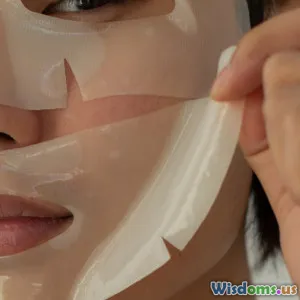
Retinol vs Vitamin C Serums Which Is Better for Aging Skin
10 min read Explore retinol vs vitamin C serums to find the best for aging skin with science-backed insights and skincare tips. (0 Reviews)
Retinol vs Vitamin C Serums: Which Is Better for Aging Skin?
Aging skin is a universal concern, sparking the quest for effective solutions to slow down wrinkles, restore radiance, and boost skin health. Among the plethora of skincare products, retinol and vitamin C serums stand out as powerhouse ingredients touted for their anti-aging benefits. But which one truly deserves a place in your daily regimen? This article dives deep to unpack their differences, benefits, and practical advice to help you make an informed choice for your aging skin.
Understanding Aging Skin: Why Target These Ingredients?
As we age, our skin undergoes structural changes: collagen production decreases, elasticity wanes, pigmentation irregularities emerge, and damage from environmental factors accumulates. These changes manifest as fine lines, wrinkles, dryness, dullness, and age spots. Effective anti-aging skincare aims to stimulate collagen, brighten complexion, and protect against oxidative damage — goals met by both retinol and vitamin C, but through different mechanisms.
Retinol: The Gold Standard for Cell Turnover
What is Retinol?
Retinol is a derivative of vitamin A and belongs to the retinoid family. It is well known for its ability to influence skin cell behavior by promoting faster turnover and boosting collagen synthesis.
How Retinol Works on Aging Skin
- Promotes Cell Renewal: Retinol accelerates the shedding of dead skin cells and the production of new ones, leading to smoother, fresher skin.
- Stimulates Collagen Production: Studies have shown retinol enhances collagen synthesis, improving skin firmness and reducing wrinkles (Kafi et al., 2007).
- Improves Pigmentation: It can help fade age spots and even out skin tone by encouraging epidermal skin renewal.
Scientific Evidence
A landmark research published in the Archives of Dermatology found that topical retinol led to noticeable improvements in fine wrinkles after consistent use over 24 weeks (Kafi et al., 2007). This underscores retinol’s long-term efficacy.
Application Tips & Considerations
- Start Slowly: Retinol can cause irritation, dryness, or redness especially when first introduced.
- Use at Night: Sunlight degrades retinol effectiveness.
- Sun Protection is Crucial: Retinol sensitizes skin; always apply broad-spectrum sunscreen during daytime.
Vitamin C Serum: The Antioxidant Shield
What is Vitamin C in Skincare?
Vitamin C, typically in the form of L-ascorbic acid, is a potent antioxidant known for its role in collagen formation and protection against oxidative stress from UV rays and pollution.
How Vitamin C Works on Aging Skin
- Neutralizes Free Radicals: Prevents oxidative damage, a key driver of aging.
- Stimulates Collagen Synthesis: Enhances collagen production supporting skin structure.
- Brightens Skin Tone: Vitamin C inhibits melanin production, reducing hyperpigmentation and promoting radiance.
- Anti-Inflammatory Effects: Helps calm and repair the skin barrier.
Research-Backed Benefits
Clinical studies highlight that consistent topical vitamin C application significantly improves skin texture, firmness, and brightness (Pullar JM, Carr AC, Vissers MC, 2017).
Application Tips & Considerations
- Use in Morning Routine: Offers UV protection enhancement alongside sunscreen.
- Choose Stable Formulations: Vitamin C oxidizes quickly; ferulic acid or vitamin E are often added to boost stability.
- Concentration Matters: 10-20% L-ascorbic acid is optimal; higher can cause irritation.
Retinol vs Vitamin C: Key Differences & Which One is Right for You?
| Factor | Retinol | Vitamin C |
|---|---|---|
| Mechanism | Boosts cell turnover and collagen | Antioxidant protection & collagen stimulation |
| Skin Sensitivity | Higher chance of irritation and dryness | Generally well tolerated, though can sting |
| Best Time to Use | Night | Morning |
| Target Skin Issues | Wrinkles, texture, pigmentation | Sun damage, dullness, fine lines, uneven tone |
Should You Use Both?
In many skincare protocols, retinol and vitamin C serums are used complementary rather than exclusive. Vitamin C in the morning protects and brightens, while retinol at night repairs and renews. However, layering them simultaneously can increase irritation in sensitive skin.
Personalizing Your Choice
- Sensitive or new to actives: Start with vitamin C serum to build tolerance.
- Targeting fine lines and uneven skin texture: Incorporate retinol gradually.
- Seeking brightening and antioxidant protection: Vitamin C leads.
- Want overall comprehensive anti-aging: Use both in split routines.
Real World Insights and Expert Opinions
Dr. Leslie Baumann, MD, a noted dermatologist and author of 'Cosmetics Dermatology,' advises that "Vitamin C is an excellent antioxidant to prevent damage and brighten skin tone, while retinol is a proven agent to reverse signs of aging by increasing collagen and renewing skin texture." She recommends introducing vitamin C first, then slowly adding retinol as tolerance improves.
Consumer testimonials commonly echo this phased approach to avoid irritation and maximize benefits.
Conclusion: Choosing the Best Ally for Aging Skin
Deciding between retinol and vitamin C serums does not have to be an exclusive choice. Both have robust clinical support and target distinct facets of skin aging. Vitamin C offers vital antioxidant protection, radiance, and supports collagen, making it superb for daytime use and prevention. Retinol drives cellular regeneration and deeper wrinkle reduction, ideal for nighttime repair.
Each skin type and sensitivity level will influence your preference. Starting with vitamin C serum to protect and brighten, then carefully introducing retinol for deeper anti-aging effects, is a balanced approach. Coupled with diligent sun protection and hydration, these ingredients form a potent foundation to maintain youthful, resilient skin.
Informed commitment and patience often yield the greatest reward — vibrant skin with age-defying qualities. Whatever you choose, consistency and proper usage remain key to unleashing their true power.
References
- Kafi, R., Kwak, H. S., Schumacher, W. E., et al. (2007). Improvement of naturally aged skin with vitamin A (retinol). Archives of Dermatology, 143(5), 606–612.
- Pullar, J. M., Carr, A. C., & Vissers, M. C. (2017). The Roles of Vitamin C in Skin Health. Nutrients, 9(8), 866.
- Baumann, L. (2016). Cosmetics Dermatology: Principles and Practice.
Whether you opt for retinol, vitamin C, or both, this overview equips you with the knowledge to craft an anti-aging strategy aligned to your skin’s unique needs.
Rate the Post
User Reviews
Popular Posts



















